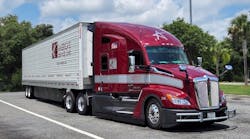A new advocacy group is being formed that seeks to create a more profitable, efficient and safe national freight system while also ensuring the environmental sustainability of transporting goods.
The non-profit Rocky Mountain Institute (RMI) is leading this effort, having formed the U.S. Council for Freight Efficiency to bring all the stakeholders in the freight community – trucking companies, railroads, marine carriers, manufacturers, suppliers, and others – under one roof to re-invent how freight is transported in this country.
The group will hold its first meeting, at the University of Chicago's Gleacher Center, on Tuesday Nov. 3 – the start of a three-day event focused exclusively on the trucking industry, said Hiroko Kawai, principal of RMI's Mobility and Vehicle Efficiency (MOVE) team.
“One of our goals is to create a ‘Consumer Reports’ resource for trucking – a trustworthy source of tangible, practical information on equipment, software, and other services trucking companies can use to improve their fuel efficiency, productivity, and safety while being more ‘green’ at the same time,” Kawai told FleetOwner.
“The freight industry – and the trucking industry in particular – has been burned by a snake-oil salesman approach to technology,” she continued. “There is a lack of trustworthy information evaluating different technologies for fleets to make investment decisions. The same challenges are also shared by producers of technologies; they cannot accelerate the market adoption of their R&D [research and development] efforts, and it is hard for them to lead the market even when they offer the necessary innovations."
Kawai added that RMI has invited fleets, drivers, truck OEMs, component suppliers, technology providers, innovation engineering firms, policy makers, NGOs [non-governmental organizations], and research institutes to attend the council’s inaugural meeting.
“It’s important to have a broad slice of the trucking industry at this meeting – especially the drivers,” she explained. “They are the ones operating the trucks; they are the ones on the front lines. Owner-operators and smaller carriers in particular run primarily older equipment, which make up a large amount of the trucks on the road. So the focus is not just on making new trucks more efficient and environmentally effective – that’s been done; they are arriving next year. We must find more affordable and effective ways to retrofit older trucks.”
Eventually, Kawai expects the council to expand this effort to other freight sectors, notably railroads and marine carriers operating on inland, coastal, and ocean waterways. “We’re not just focused on truck efficiency – we’re focused on freight efficiency, so the future needs to include trains and ships,” she said.
“That also includes discussing infrastructure issues necessary to support all three modes,” Kawai said. “For example, in the Western states, longer combination vehicles (LCVs) and truck-dedicated highway lanes offer efficiency opportunities. But those don’t necessarily work in the more urbanized Northeastern states – there, intermodal may be a more efficient option.”
Kawai stressed, too, that the freight industry cannot be broken up by “modal rivalries” anymore, such as in the historic rail vs. truck competition. “Nor can we look at freight solutions too broadly in the U.S.,” she observed. “We must look at what provides the more efficient and environmentally friendly options – and that will is most easily decided on a region by region, case by case, and business by business basis.”




